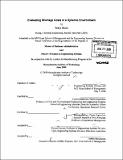Evaluating shortage costs in a dynamic environment
Author(s)
Dhalla, Nadya
DownloadFull printable version (22.98Mb)
Other Contributors
Leaders for Manufacturing Program.
Advisor
Cynthia Barnhart and Jérémie Gallien.
Terms of use
Metadata
Show full item recordAbstract
Dell's Direct Business Model and its global supply chain are the foundations of the company's success. These strategies, however, bring about problems such as long inbound supply lead times and hard-to-predict site-level forecasts which presents a challenge when managing supply. Mismanagement of supply can lead to part shortages within the factories and subsequent product delivery delays to the end customers. This study proposes a method of quantifying the cost of these delays in a dynamic environment. The first stage of this thesis seeks to understand the implications of part shortages to various business groups within the firm. The second stage isolates and quantifies the major short-term and long-term cost drivers for two types of customer groups: those who have already purchased a system from Dell but are later notified of a delay (customer Type 1) and those who elect not to purchase from Dell because the quoted lead times are longer then they are willing to wait (customer Type 2). The final stage presents the project impact on several groups within the company, including the procurement department, the factories and the customer-focused groups. The results of this project demonstrate that shortage costs at Dell are variable and depend on many factors such as the demand for parts, the lead time quoted to customers, the average selling margin of each system and the location of the factory in which the orders are built. By creating a process to quantify the cost drivers in this dynamic environment, each group within the company is able to identify opportunities for improved decision-making and can explore the cost trade-offs of various policy decisions to maximize benefit to both Dell and its customers.
Description
Thesis (M.B.A.)--Massachusetts Institute of Technology, Sloan School of Management; and, (S.M.)--Massachusetts Institute of Technology, Engineering Systems Division; in conjunction with the Leaders for Manufacturing Program at MIT, 2008. Includes bibliographical references (p. 79-80).
Date issued
2008Department
Leaders for Manufacturing Program at MIT; Massachusetts Institute of Technology. Engineering Systems Division; Sloan School of ManagementPublisher
Massachusetts Institute of Technology
Keywords
Sloan School of Management., Engineering Systems Division., Leaders for Manufacturing Program.